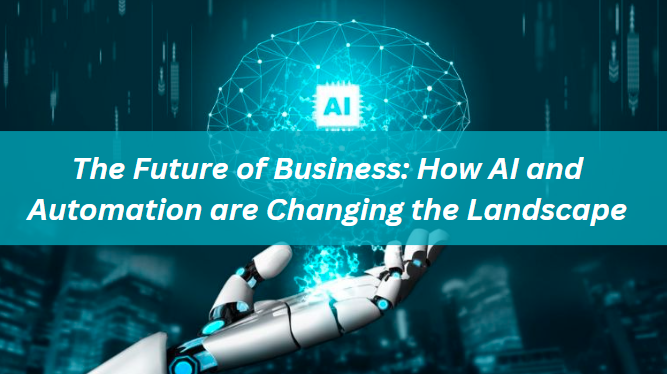Artificial Intelligence (AI) and automation are transforming the business world, driving efficiency, innovation, and growth. As these technologies advance, their impact on various industries becomes more profound, reshaping how companies operate and compete. This article explores how AI and automation are changing the business landscape, their benefits, challenges, and future implications.
Contents
The Rise of AI and Automation in Business
AI refers to the simulation of human intelligence in machines that are programmed to think and learn. Automation, on the other hand, involves using technology to perform tasks without human intervention. Both have been around for decades, but recent advancements in machine learning, data analytics, and robotics have accelerated their adoption in business.
Key Drivers
Several factors are driving the rise of AI and automation in business:
- Technological Advancements: Improvements in computing power, data storage, and algorithm development have made AI and automation more accessible and effective.
- Cost Reduction: Automation can significantly reduce operational costs by minimizing human error and increasing efficiency.
- Data Explosion: The growing volume of data generated by businesses provides the raw material for AI algorithms to learn and improve.
- Competitive Pressure: Companies are adopting AI and automation to stay competitive, improve customer experiences, and innovate.
Transforming Business Operations
AI and automation are revolutionizing various aspects of business operations, from customer service to supply chain management.
Customer Service
AI-powered chatbots and virtual assistants are transforming customer service by providing instant, 24/7 support. These tools can handle routine inquiries, resolve issues, and guide customers through processes, freeing human agents to focus on complex tasks. For example, AI-driven systems like IBM Watson Assistant and Microsoft’s Azure Bot Service offer personalized interactions based on customer data, enhancing user satisfaction.
Marketing and Sales
AI is revolutionizing marketing and sales through personalized recommendations, predictive analytics, and targeted advertising. Machine learning algorithms analyze customer behavior and preferences to deliver personalized content and product suggestions. Companies like Amazon and Netflix use AI to recommend products and content, driving engagement and sales.
Predictive analytics helps businesses forecast demand, optimize pricing, and identify high-value customers. By analyzing historical data, AI can predict future trends and customer behavior, enabling companies to make informed decisions and allocate resources effectively.
Supply Chain and Logistics
Automation is transforming supply chain and logistics by improving efficiency, reducing costs, and enhancing accuracy. Automated warehouses use robots and drones for inventory management, picking, and packing, minimizing human error and speeding up processes. Companies like Amazon and Walmart are investing heavily in automated warehousing to meet growing e-commerce demands.
AI-powered analytics optimize supply chain operations by predicting demand, identifying bottlenecks, and suggesting improvements. Predictive maintenance, enabled by IoT sensors and AI, helps prevent equipment failures and reduce downtime.
Human Resources
AI and automation are streamlining HR processes, from recruitment to employee engagement. AI-driven recruitment tools screen resumes, assess candidates, and conduct initial interviews, saving time and improving hiring quality. Companies like LinkedIn and HireVue use AI to match candidates with job openings and evaluate their suitability.
Automation in HR also enhances employee engagement through personalized learning and development programs. AI-powered platforms can recommend training courses, monitor performance, and provide feedback, helping employees grow and succeed.
Benefits of AI and Automation
The integration of AI and automation offers numerous benefits to businesses:
Increased Efficiency
Automation of repetitive tasks increases operational efficiency by reducing the time and effort required to complete them. This allows employees to focus on strategic and creative tasks that add more value to the business.
Cost Savings
AI and automation can significantly reduce labor costs by performing tasks that would otherwise require human intervention. This is particularly beneficial for industries with high labor costs and repetitive processes.
Improved Accuracy
Automation minimizes human error, leading to more accurate and reliable outcomes. This is crucial in industries like healthcare and finance, where errors can have significant consequences.
Enhanced Customer Experience
AI-driven personalization and instant support improve customer satisfaction and loyalty. By understanding customer needs and preferences, businesses can deliver tailored experiences that resonate with their audience.
Innovation and Competitive Advantage
AI and automation enable businesses to innovate and stay ahead of competitors. By leveraging these technologies, companies can develop new products, services, and business models that differentiate them from the competition.
Challenges and Considerations
While the benefits of AI and automation are compelling, there are challenges and considerations that businesses must address:
Job Displacement
One of the most significant concerns is the potential displacement of jobs due to automation. While AI can create new job opportunities, it can also render certain roles obsolete. Businesses must focus on reskilling and upskilling employees to adapt to the changing job landscape.
Data Privacy and Security
The widespread use of AI involves collecting and analyzing vast amounts of data, raising concerns about privacy and security. Businesses must ensure they comply with data protection regulations and implement robust security measures to protect sensitive information.
Ethical Considerations
AI systems can sometimes exhibit biases based on the data they are trained on. Companies must ensure that their AI algorithms are fair, transparent, and ethical, avoiding discrimination and ensuring equal treatment.
Integration and Adaptation
Integrating AI and automation into existing systems can be complex and costly. Businesses must invest in the right infrastructure, training, and change management to successfully adopt these technologies.
The Future of AI and Automation in Business
The future of AI and automation in business is promising, with continued advancements expected to drive further transformation.
Autonomous Systems
The development of autonomous systems, such as self-driving cars and drones, will revolutionize industries like transportation and logistics. These systems can operate without human intervention, improving efficiency and safety.
AI-Driven Innovation
AI will continue to drive innovation in products and services. From smart home devices to personalized healthcare solutions, AI will enable businesses to create new offerings that meet evolving customer needs.
Human-Machine Collaboration
The future will see increased collaboration between humans and machines. AI and automation will augment human capabilities, allowing employees to focus on high-value tasks while machines handle routine operations.
Sustainability and Efficiency
AI and automation can contribute to sustainability efforts by optimizing resource use, reducing waste, and improving energy efficiency. Businesses can leverage these technologies to achieve their sustainability goals and reduce their environmental impact.
Global Connectivity
AI and automation will enhance global connectivity by enabling seamless communication and collaboration across borders. Businesses can leverage these technologies to expand their reach and operate in a global marketplace.
Conclusion
AI and automation are reshaping the business landscape, offering unprecedented opportunities for efficiency, innovation, and growth. While there are challenges to address, the benefits far outweigh the risks. As businesses continue to embrace these technologies, they will be better positioned to navigate the complexities of the modern world and thrive in a competitive market. The future of business lies in harnessing the power of AI and automation to drive success and create a better, more efficient world.




